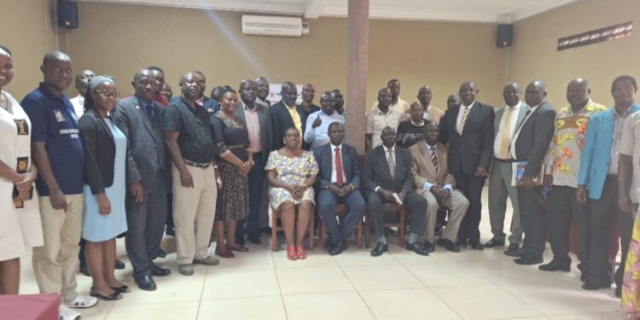
The Minister for Presidency, Hon. Babirye Milly Babalanda has urged the District Security Committees in Karamoja to double efforts in establishing intelligence networks in order to curb cattle rustling in the sub-region.
The District Security Committee is chaired by the Resident District Commissioner (RDC). Karamoja as a sub region is composed of nine districts which include; Kotido, Kaabong, Karenga, Nabilatuk, Abim , Moroto , Napak, Amudat and Nakapiripirit.
“The efforts at fighting cattle thefts are also going on well. I encourage the security committees to double your efforts in establishing intelligence networks across the region so that Karamoja can be rid of this terrible vice which has for decades had a negative impact on farming and business activities and resulted in loss of lives. Cattle rustling is a very big stumbling block to the development of Karamoja and the neighboring districts and it must be fought with both hands,” Hon. Babalanda said.
The Presidency Minister made the remarks yesterday in her speech read by the Minister of State for Kampala and Metropolitan Affairs, Hon. Kabuye Kyofatogabye who represented her at the closure of a 3- day capacity building workshop for RDCs, DRDCs, RISOs and DISOs from Karamoja sub region. The event was held at Akello Hotel in Soroti.
The Minister was also delighted to note that significant effort has gone into disarmament with evidence of recovery of guns, saying that this is creating a window of peace in the sub-region.
“I encourage you to as much as it will get, to publicise these gun recoveries so that the rest of the communities can see what is being done and get inspired to surrender their guns or to report those still holding them.”
Hon. Babalanda also said that the matter of fighting poverty is also critical to the region.
She said that Karamoja has received Parish Development Model (PDM) and Emyooga money and there should be no excuse for the people failing to benefit.
“Given the current situation of the communities, I would imagine that quite a large proportion of the population should qualify and benefit from the funds. Therefore, these two government programs should have such a wide ranging impact in the sub-region and you are called upon to ensure that this is attained. Indeed, all the government funds should be utilised to the last coin and should have clear value where they are invested.”
The Minister also commended the efforts of the participants at working in harmony and making contributions as teams.
“Being Resident (and not visiting) RDCs in your district of work. You are Resident District Commissioners (RDCs) and not Non-Resident District Commissioners (NRDCs). Visiting RDCs will not be tolerated, going forward,” she said.
“Monitoring of all projects or activities being implemented in your respective districts/cities; whether they be government or donor funded. Wherever possible, physically verify what is being done. Advocate for what is right and go against what is wrong.”
During the same workshop, the RDCs resolved to preach the gospel of unity and prosperity in the sub region.
“We have resolved to create harmony within the Karamoja sub-region amongst both political and all leaders across the whole spectrum and more within our own offices as RDCs,” Maj. Martha Asiimwe the head of the RDC secretariat read out the resolutions of the meeting before the minister.
“We have also committed ourselves to mobilize and participate in all government programs so that the NRM government and its manifesto is felt,” she added.
The Head of Special Programs at Uganda AIDS Commission (UAC), Ms. Lilian Tatwebwa who represented the Director General of the commission urged the participants to provide clear and accurate information to communities on how to prevent HIV/AIDS.
She said as leaders, they have a mandate to offer support and protection to families whose members are affected by HIV and AIDS.
“You should mobilise communities to fight negative social cultural practices such as child marriages, Gender based violence, alcohol and drug abuse and other behaviours that expose people to the risk of HIV,” Ms Tatwebwa said.
“Ensure inclusion of people living with HIV in economic empowerment and social protection programs.”
Ms. Tatwebwa further noted that during the World AIDS Day and New Year message, President Yoweri Museveni re-emphasized the need to amplify HIV messages through the RDCs/RCCs to the communities.
“UAC has developed messages which H.E has approved as enshrined in the Presidential handbook. H.E has voiced out these messages and they are currently running on air through radios and TV. These are the messages that have been packaged for use by the RDCs/RCCs.”
On the other hand, Maj. Asiimwe said the Regional Capacity Building Workshops for RDCs/RCCs, deputies and DISOs are meant to remind the commissioners and DISOs of their core mandate of supervision, monitoring, mobilisation and effective representation of the Central Government and H.E the President.
She further noted that they are also intended to equip the participants with more appropriate skills and tools to enhance their operation in their respective districts and cities.
“The workshops are also aimed at refocusing the commissioners and DISOs to critical and prioritised government programs and projects where they should lead to achieve set objectives and ultimate goals,” said Maj. Asiimwe, who is also the focal point person for PDM and Emyooga programs.
“The workshops also help the commissioners to share with their supervisors the challenges affecting their operations in the field,” she added.
The workshop was also attended by officials from the office of the President, among others.






